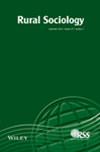把社区带入呻吟区:面对人口变化、种族多样性和政治差异的主观幸福感
IF 2.3
3区 社会学
Q2 SOCIOLOGY
引用次数: 0
摘要
本文取材于美国科罗拉多州两个农村社区的数据集。数据收集分两个时期进行:2019年底和2020年中期的COVID-19封锁期间。这些社区在人口统计学上有所不同:一个社区的少数民族人口不断增长,尤其是在年轻人中;另一个则是压倒性的白人。本文在色盲意识形态、动机推理和网络同质性等概念的帮助下,对主观幸福感(SWB)的概念提出了质疑,因为它询问了不适的生产潜力。虽然在社区发展的背景下思考所谓的积极情绪状态很重要,但我们也必须问这样的问题,“幸福感是为了谁,以谁为代价?”受访者如何看待个人和社区层面的SWB与他们所在的社交网络有很大关系。从SWB的角度来看,我还探讨了为什么从经济(物质)角度来看,在同一时期,遭受大流行相关破坏的社区比其他社区表现得更差。社会学因素解释了这些动态,这些动态被用来加强我们对如何以富有成效的方式将社区发展概念化的理解。总而言之,我认为不适的某些表达是有价值的,因此对于创建有弹性、繁荣和最终公正的社区是必要的。本文章由计算机程序翻译,如有差异,请以英文原文为准。
Taking Communities into the Groan Zone: Subjective Wellbeing in the Face of Demographic Change, Racial Diversity, and Political Difference☆
This paper draws from a dataset focusing on two rural communities in Colorado (USA). Data collection occurred over two periods: late-2019 and again during COVID-19 lockdowns in mid-2020. The communities differed demographically: one had a growing minoritized population, especially among its youth; the other was overwhelmingly white. The paper troubles the concept of subjective wellbeing (SWB) as it asks about the productive potentials of discomfort, with assistance from such concepts as colorblind ideology, motivated reasoning, and network homophily. While important to think about so-called positive emotional states in the context of community development, we must also ask questions like, “SWB for who and at whose expense?” How respondents thought about individual- and community-level SWB had much to do with the social networks they were in. I also explore why the community that fared pandemic-related disruptions, from a SWB standpoint, better than the other performed worse during this same period from an economic (material) standpoint. Sociological factors explain these dynamics, which are leveraged to enhance our understanding of how to conceptualize community development in productive ways. In sum, I argue that certain expressions of discomfort have value and are therefore necessary for creating resilient, flourishing, and, ultimately, just communities.
求助全文
通过发布文献求助,成功后即可免费获取论文全文。
去求助
来源期刊

RURAL SOCIOLOGY
SOCIOLOGY-
CiteScore
4.60
自引率
13.00%
发文量
47
期刊介绍:
A forum for cutting-edge research, Rural Sociology explores sociological and interdisciplinary approaches to emerging social issues and new approaches to recurring social issues affecting rural people and places. The journal is particularly interested in advancing sociological theory and welcomes the use of a wide range of social science methodologies. Manuscripts that use a sociological perspective to address the effects of local and global systems on rural people and places, rural community revitalization, rural demographic changes, rural poverty, natural resource allocations, the environment, food and agricultural systems, and related topics from all regions of the world are welcome. Rural Sociology also accepts papers that significantly advance the measurement of key sociological concepts or provide well-documented critical analysis of one or more theories as these measures and analyses are related to rural sociology.
 求助内容:
求助内容: 应助结果提醒方式:
应助结果提醒方式:


